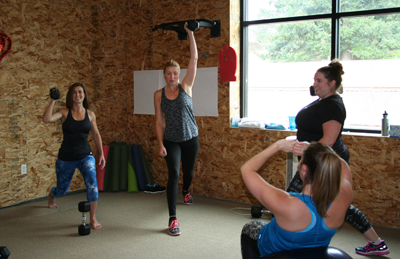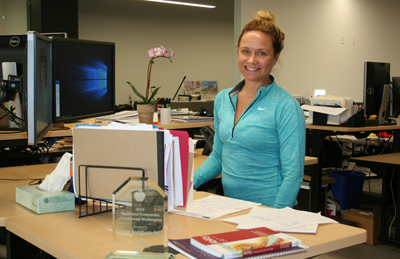Winners and finalists of this year’s Healthiest Companies of Southwest Washington Awards draw from several similar concepts. Their most important commonality, however, is that they’ve all embraced the value of investing in workplace wellness.
Multiple scientific studies have been conducted in the last five years in particular about the benefits of workplace wellness programs. Although return on investment (ROI) should not be considered the only driving force in implementing formal steps to improve overall health of a company, successful programs have been able to hold healthcare costs at static and even see premium decreases in some cases.
Research conducted by Kaiser Permanente found that additional annual costs per employee linked to smoking is $5,800; diabetes $4,413; obesity $4,237; and high blood pressure $1,077. It stands to reason that adopting healthier habits where Americans spend an average 40 hour work week at can have a tremendous impact in their off hours, as well.
 Local companies note that the biggest barrier to participation can be changing staff perception. Dynamic Events, one of two award recipients for mid-sized employer, pays its employees to utilize their on-site gym by attending professional fitness training and yoga classes during business hours.
Local companies note that the biggest barrier to participation can be changing staff perception. Dynamic Events, one of two award recipients for mid-sized employer, pays its employees to utilize their on-site gym by attending professional fitness training and yoga classes during business hours.
Kayte Kuhn, wellness committee member and benefits and payroll administrator at Dynamic Events, said, “Encouraging the team to step away from their desk for one hour took time – they initially felt guilty. It starts from the top down. Our owner will work out with us when she has a chance to.”
 Although physical health is the most obvious component of wellness, successful programs approach the topic holistically. Lacamas Counseling, winner of Healthiest Company-small employer, achieves 100 percent employee participation by having a clear set of core values that address emotional, cognitive, interpersonal and vocational health as well as the physical aspect.
Although physical health is the most obvious component of wellness, successful programs approach the topic holistically. Lacamas Counseling, winner of Healthiest Company-small employer, achieves 100 percent employee participation by having a clear set of core values that address emotional, cognitive, interpersonal and vocational health as well as the physical aspect.
With limited resources to commit to their wellness program, Lacamas relies heavily on collaborative ideas and intentional moments. Standing desks, clean line furnishings and office space, the incorporation of windows for the health of the counselors as well as their clients, walking meetings and stretches during 30 minute breaks are all simple strategies that the team reaps benefits from. Another affordable approach seems to be making the greatest difference.
“We believe efforts to stay emotionally and relationally healthy will impact our clients,” Priscilla Gilbert, owner of Lacamas, said. “We take a lot of care to be invested in the people that we’re working with. Are they struggling with anything? We get to know each other’s children, have each other over for dinner, go on an annual camping trip for team building. These concepts all had a lot of buy-in for counselors joining Lacamas.”
ControlTek, large employer winner, incorporates diversity into their wellness program and activities. They realize that not everyone can or wants to commit the time to train for a marathon and that small actions add up to big changes. These include rewards for climbing stairs, drinking eight 8-ounce glasses of water a day, going on a walk with family and other realistic efforts.
ControlTek’s wellness program, Forward Living, also has a large emphasis on education. Stacey Smith, vice president of human resources and marketing, pointed out that people hear about the negative effects of smoking, diabetes and high blood pressure but there can be a disconnect relating that to their actions and lifestyle choices. Wellness workshops presented during business hours aim at illustrating how food and sedentary choices can manifest into preventable diseases and conditions. A recent workshop series addressed vitamins – the benefits of supplements, how to obtain the daily recommended dosage from food, what foods are best eaten raw versus cooked to maximize their vitamin efficiency and so on.
For larger companies who don’t have the luxury of relationship development to the extent of smaller ones or companies whose livelihood is derived from a rather sedentary position, innovation becomes the key for success.
Accounting firm Opsahl-Dawson, mid-sized employer finalist, could’ve decided that being tied to their desks for nearly three months during the tax season was reason enough to postpone fitness until a more convenient time of the year. Rather than take a fatalistic approach, they asked themselves, “What can we do?” Provide healthy snacks and lunches in-house that are replenished twice weekly was one answer. Another is their ‘Biggest Loser’ challenge which incorporates the Fitbit app, encourages accountability and connects the work group in an effort to support each other’s fitness goals. Opsahl is a perfect example that, although some companies have fewer time constraints, larger budgets or more physical jobs, there are ways to incorporate wellness into every industry and situation.
Stocking workplace kitchens with healthy food choices, in an effort to reduce fast food dependency, is a wellness strategy adopted by many of this year’s nominees.
“That’s something (healthy snack options) we heard out in the community and that’s helped them (staff) become a healthier group,” Kuhn said.
Whether emphasizing healthy foods for monthly potlucks; having healthy cooking demonstrations at yearly wellness events; providing fruits and vegetables at company meetings; replacing sweet treats with nutritious snacks in vending machines; or supplying a variety of energy-boosting breakroom foods like granola bars, fruit, vegetables, hummus and string cheese, employers are ditching the donuts for better food choices.
What the 15 companies showcased this year – and all companies with an established workplace wellness program – have learned is that investing in the wellbeing of their employees benefits their bottom line. Employees feel more valued, companies with active wellness programs experience less turnover, absenteeism decreases, staff is more engaged at work, more tight knit teams are created and the rising cost of healthcare becomes less of a factor as work groups experience better health.
2016 Healthiest Companies
Nonprofit/Public Sector:
Award recipient: Fort Vancouver Regional Library– Finalist: Clark County Food Bank
Small Employer:
Award recipient: Lacamas Counseling – Finalists: Northwest Personal Training; Sweet Spot Skirts
Mid-sized Employer:
Award recipient: (Tie) LSW Architects; Dynamic Events – Finalists: Mill Creek Pub; Opsahl Dawson
Large Employer:
Award recipient: (Tie) ControlTek; Nautilus – Finalists: Banfield Pet Hospital; Wafertech
Headquartered outside of Southwest Washington:
Award recipient: Perkins & Co. – Finalist: Miller Nash Graham & Dunn









